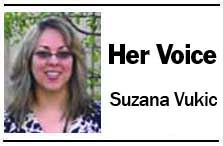The Bosniak community of Canada, with a population of over 50,000, has been lobbying to have July 11 declared as the Srebrenica Remembrance Day in Canada. On June 9, this campaign, known as Bill M-416, was introduced in Parliament. Prime Minister Harper and the Conservative Party vetoed the bill. Harper will not allow this resolution to pass with the word “genocide” in it. The only way he’d allow it to go through is if the word genocide is removed from the text. Canada’s Bosniak community has responded to Harper’s gesture with a resounding “No”.
On July 11, 1995, Bosnian Serb troops, led by General Ratko Mladic, overran what was supposed to be the UN safe haven of Srebrenica. The Dutch peacekeepers who were protecting Srebrenica were unable to stop Mladic and his troops from overtaking the town and surrounding villages. In the days that followed, Serb troops gathered up the Bosnian Muslim population, separating the men from the women. An estimated 25,000 women and girls were forcibly transported to Bosnian-held territory. An estimated 8000 men and boys, from the youngest to the oldest, were massacred. Their bodies were dumped into mass graves. It’s the largest massacre to have taken place on European soil since the end of World War II.
The average Canadian would have a difficult time understanding what happened in the early 1990’s with the breakup of the former Yugoslavia and the wars that followed. Unless you’re from the region or have connections to it, it’s something you’d be unable to relate to.
Imagine living in the heart of civilized Europe, in a town as pleasant as, say, Hudson. You live side by side with neighbours that have been your friends for as long as you can remember. These people might be of a background that is different from your own, but you’re oblivious to these differences. These things simply don’t matter to you. That’s not what you’re all about.
Then one day, for reasons beyond your control, all of this changes. The neighbourly friendship comes to a stop. You either find yourself in a position where you’re ready to pack up and leave town with your family as quickly as you can, or you’re compelled to stay, and it’s your neighbours who are making a hasty exit with their families and whatever earthly possessions they can possibly bring along. The battle lines are drawn. Yesterday’s world is gone forever.
What follows is a life of unimaginable horror. Leaving your house and attempting to get to Main Road to try to get food and supplies for your family becomes an impossible feat. Mortar shells and sniper fire rain down from the top of Oka mountain. Your town is slowly being destroyed and people are being killed. You live in constant fear of being killed or having your family members get killed or go missing. Your greatest fear is of facing the day when the enemy will overtake your town.
Srebrenica was overtaken. And 8000 of its citizens, including people who went there seeking a safe haven, were killed on the basis of gender and ethnic origin.
As a Croatian Canadian, I followed news of the war with horror and heartache. A day like the fall of Srebrenica stays in your mind forever.
The Hague and the International Criminal Tribunal for the Former Yugoslavia (ICTY) have recognized that what happened in Srebrenica was a genocide. The European Union and the United States have passed resolutions using the word “genocide” to describe what happened in Srebrenica. So why is Harper, on the eve of the 15th anniversary of the Srebrenica Massacre, refusing to call what happened there a genocide?
Brian Masse, NDP MP for Windsor West, has taken a strong personal interest in this matter. “This is an embarrassment and shameful. As the only western country to have not passed a motion or resolution recognizing the Srebrenica genocide, the Prime Minister has diminished Canada’s position in the world on the eve of the G-8 and G-20 Summits” reads a quote on Masse’s NDP website.
This isn’t just heated political rhetoric. It is indeed shameful. It dishonours the memory of the massacre victims. It also causes added pain and suffering to survivors of the massacre, some of whom have sought refuge in Canada and have rebuilt their lives here successfully.
The message to Harper is loud and clear: recognize genocide for what it is.
Courtesy The Hudson/St. Lazare Gazette

